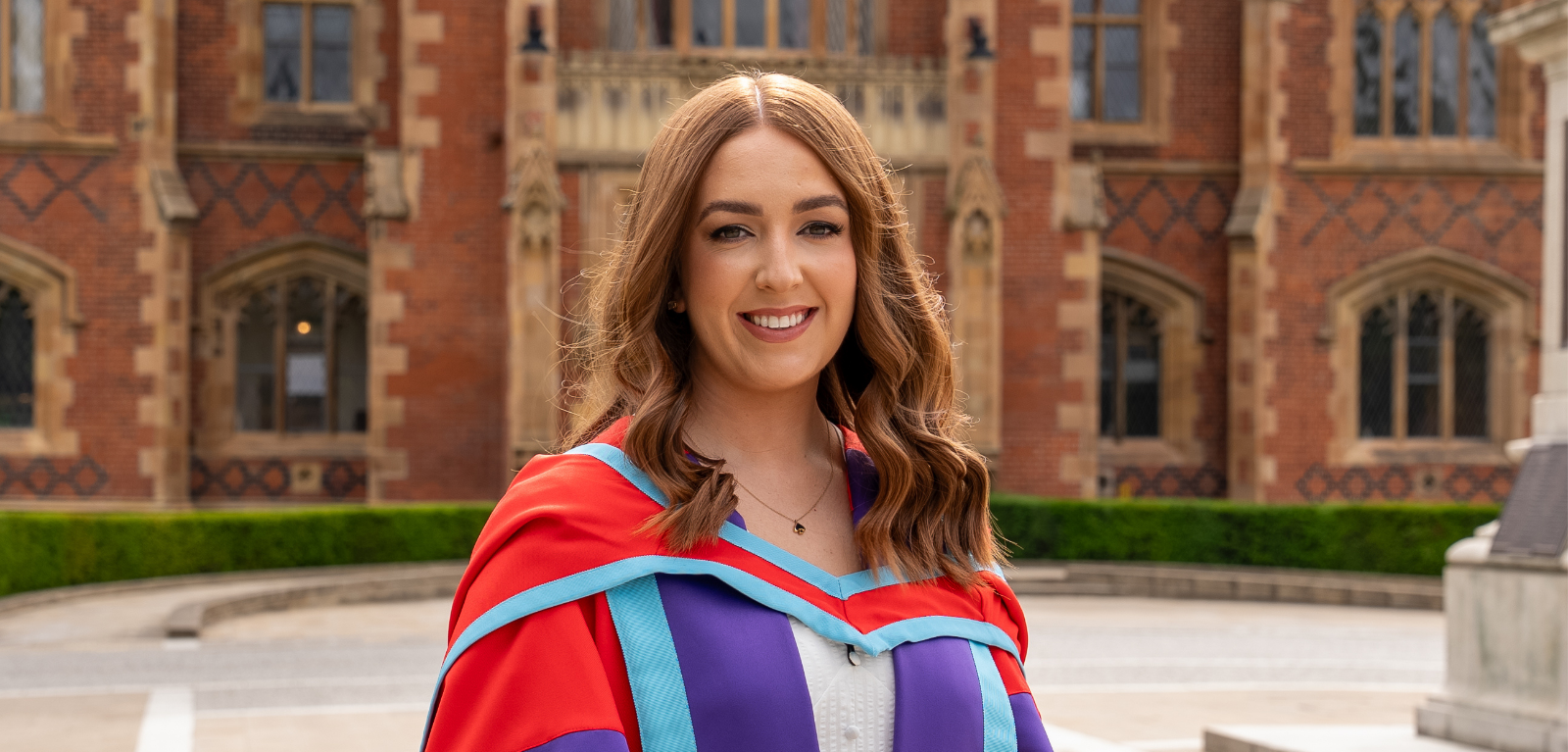Queen’s lecturer earns PhD after leading NI’s first domestic abuse training for nursing students
Dr Steph Craig is graduating today with a PhD, having progressed from undergraduate to lecturer while co-leading a groundbreaking initiative to embed domestic abuse training in the nursing curriculum.

Dr Steph Craig graduates today with a PhD from the School of Nursing and Midwifery at Queen's.
It has been a whirlwind few years for Dr Steph Craig, having worked her way from undergraduate student to Nurse Lecturer at Queen’s in a short span of time.
The Ballymoney-born nurse believes her career path has been rooted in a true passion for caring for others and for improving patient care in Northern Ireland and beyond.
As she explains:
“From the outset of my nursing studies, I became acutely aware of how little emphasis is placed on dementia care in the curriculum, despite its profound and growing impact on individuals, families, and the healthcare system. That realisation sparked something in me, it became more than just an interest, it became my passion.”
Early on in her studies, Steph began to work closely with leading organisations and charities, opening doors that led her directly to people living with dementia, an experience that she describes as “truly transformative” for her.
Steph adds:
“It allowed me to combine education with innovation and advocacy, but on a more personal level, it deepened my understanding, challenged my assumptions, and inspired the direction of my PhD research.”
Currently teaching the Year 1 undergraduate BSc Professional Nursing programme within the University, Steph believes mentorship has always been a cornerstone of her professional journey because it was such a pivotal part of her personal one.
She says:
“For me, mentoring isn’t just about guiding students academically it’s about investing in their whole development as compassionate, curious, and courageous healthcare professionals. I want my students to feel seen and heard, and to know that they are capable of more than they sometimes believe.”
Steph feels the most powerful lesson she has learned at Queen’s is how research has the incredible potential to create lasting, life-changing impact.
This is evident in Steph’s work outside of the classroom, which will take her across the world to Beijing later this year:
“I have been working with the Northern Ireland Pancreatic Cancer Charity (NIPANC), collaborating with survivors and bereaved family members to co-design an educational game on pancreatic cancer, which has been both humbling and inspiring.
“Our time in Beijing will be an amazing opportunity to further explore the global implications of this work and develop research collaborations that can amplify its impact even further.”
However, it is Steph’s most recent work that is making great impact closer to home and changing the nursing curriculum at Queen’s. Her most profound professional moment to date was co-launching a pioneering programme, The Unlock Safety Initiative, with her Director of Education.
Launched recently at Stormont, this project will begin later this year and will mean nursing students at Queen’s will be the first to receive dedicated training on domestic abuse and violence against women and girls as part of their degree.
This is something that Steph has been advocating for alongside Royal College of Nursing, Women’s Aid Federation NI and the End Violence Against Women and Girls Change Fund at The Executive Office.
Talking about the importance of this programme, Steph says:
“Standing at Stormont alongside First Minister Michelle O’Neill, Deputy First Minister Emma Little-Pengelly, and Health Minister Mike Nesbitt, during the official launch was a surreal and powerful moment for me.
“To have the support of political and sector leaders reinforces the urgency and importance of this work. For me, education isn’t just about textbooks and exams it’s about creating a safer, more informed Northern Ireland where people feel seen, supported, and empowered.”
With her sights set on making real-world impact, Steph has big hopes for the future as she continues to inspire the next generation of healthcare professionals.
And, recognising the significant role that Queen’s has played in her life, Steph is only too keen for her students to have similar experiences:
“Queen’s has given me so much not only academically, but in shaping the kind of nurse, researcher, and educator I’ve become. And if I can help students take just one thing forward with them, I hope it’s the understanding that empathy is not a soft skill it’s a powerful, transformative force in both healthcare and in life.”
Media
Media enquiries to Queen’s Communications Office via email: comms.office@qub.ac.uk or tel: (028) 9097 3091